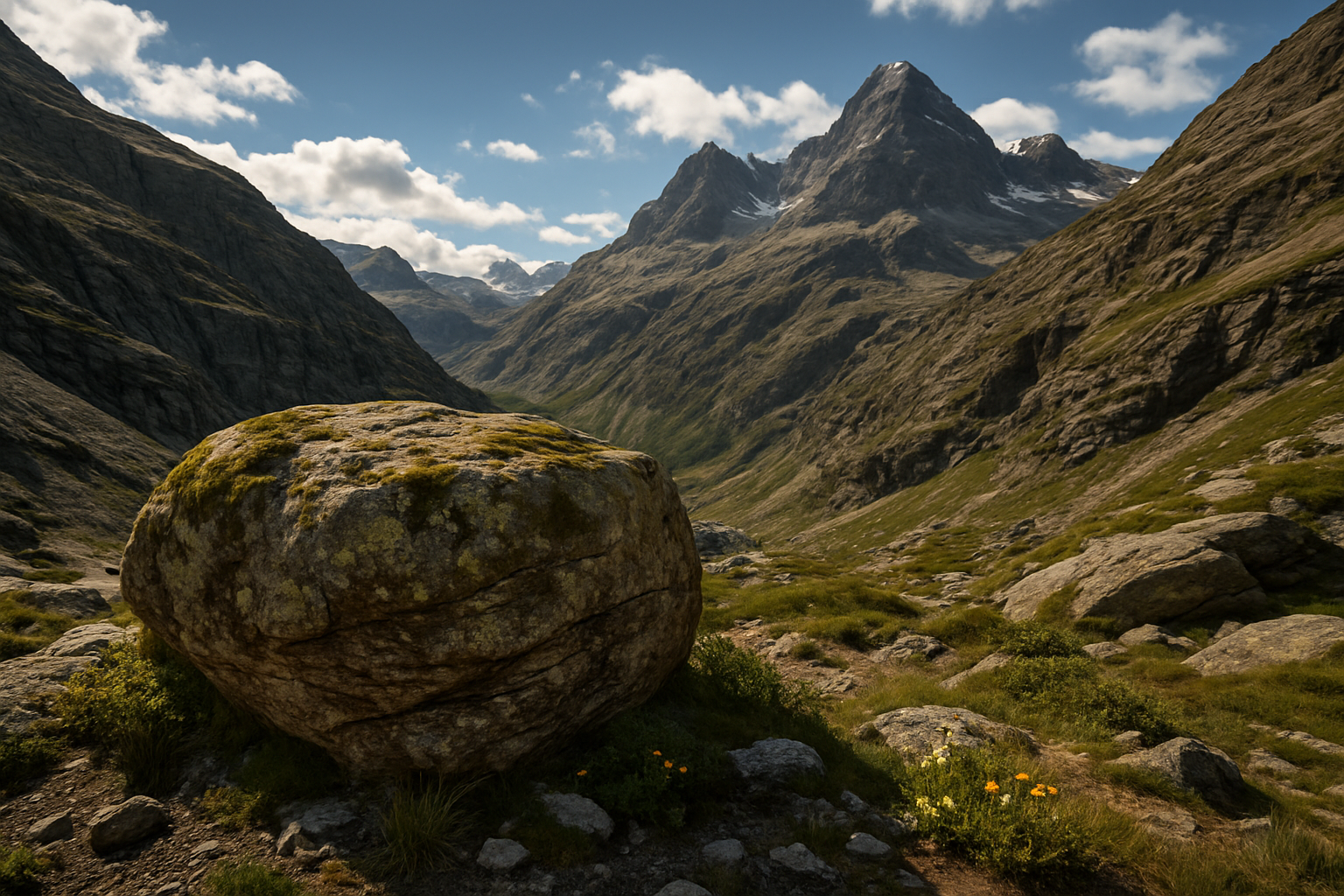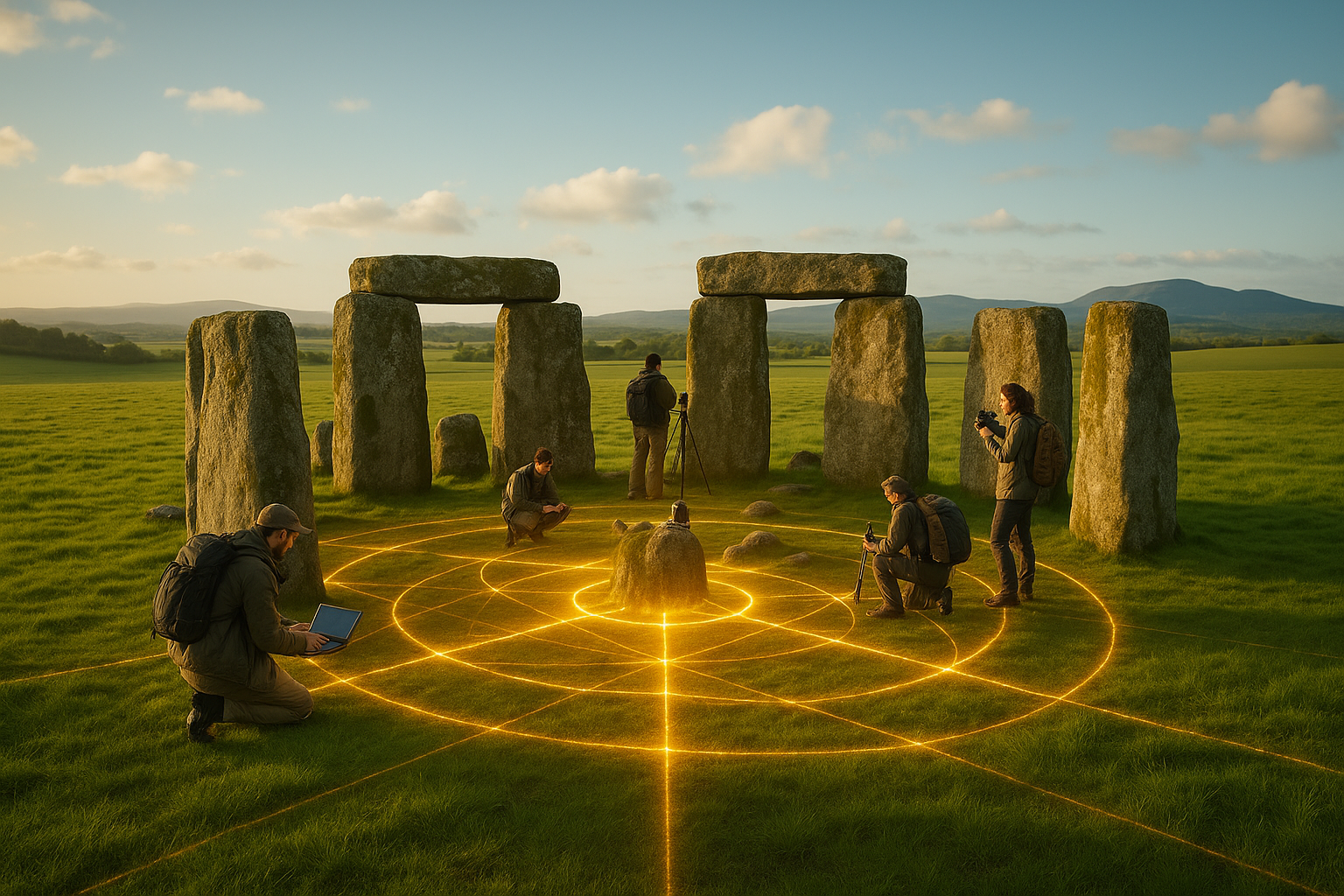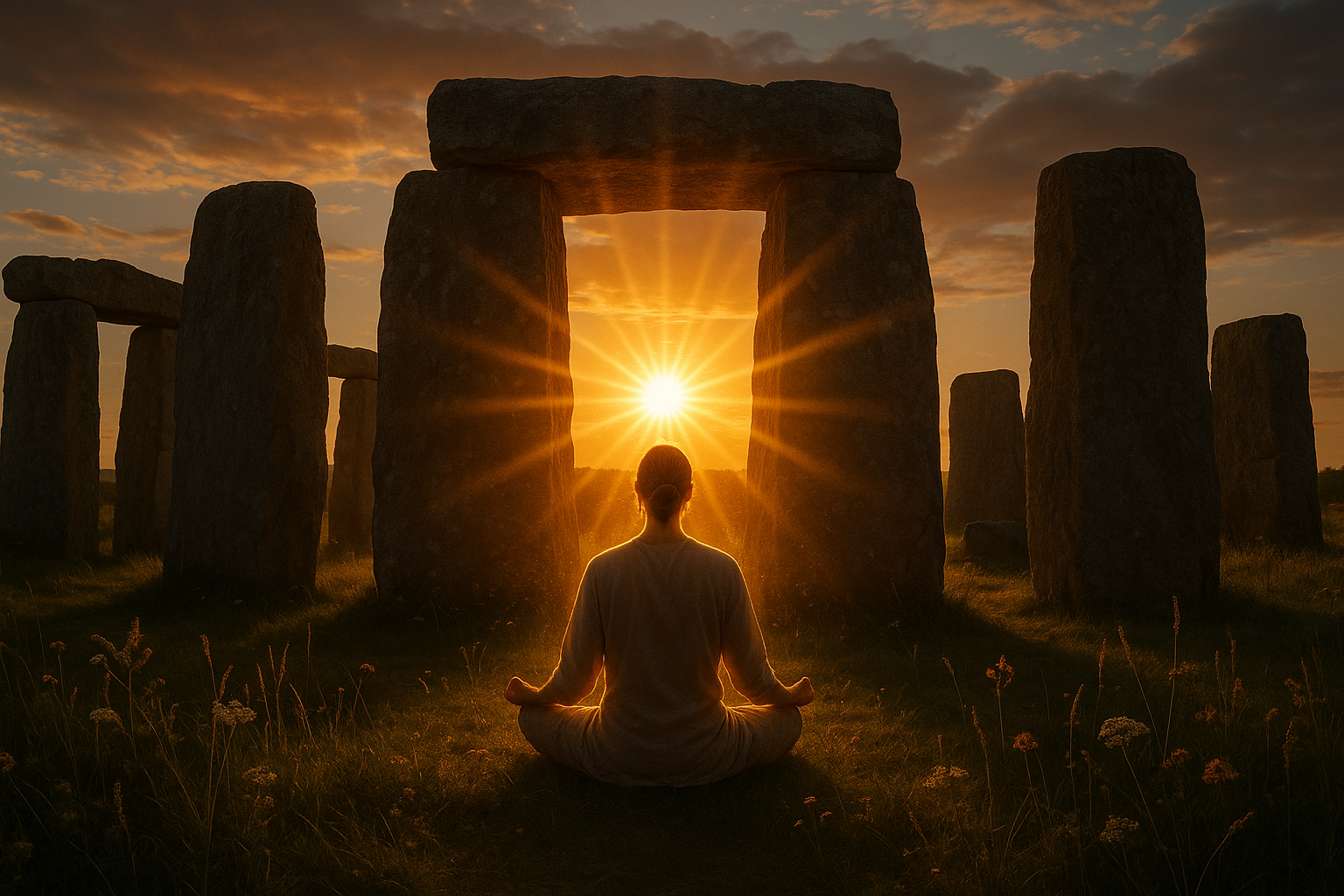In a world that’s perpetually buzzing with notifications, breaking news, and an incessant stream of social media updates, finding a moment of genuine solitude seems almost like a distant memory. The echo chambers of modern life, amplified by technology and societal pressures, often leave us feeling overwhelmed and disconnected from our own sense of peace. It’s as if we’ve been swept up in a relentless current, struggling to catch our breath amid the noise. Yet, nestled within the chaos, nature offers a refuge—a sanctuary where the soul can find respite and the mind can breathe. 🌿
Imagine stepping into a lush forest, the air crisp with the scent of pine and earth, where the only sounds are the gentle rustling of leaves and the distant call of a bird. In these moments, the mind quiets, the heart steadies, and you find yourself enveloped in an unparalleled sense of calm. This isn’t just a fleeting escape; it’s a return to something primal, something fundamentally human. Nature’s temples, these untouched realms of beauty and tranquility, invite us to shed our digital chains and reconnect with the world in its purest form. But why is it so essential to escape these echo chambers, and how can nature truly offer the serenity we seek?
This article will delve into the transformative power of nature as an antidote to modern life’s overwhelming noise. We’ll explore the psychological and physiological benefits of immersing ourselves in natural environments, from reducing stress to enhancing creativity and boosting overall well-being. Furthermore, we’ll examine practical ways to incorporate more nature into our daily routines, even amidst urban landscapes. As we navigate through these insights, we’ll also share stories from those who have found solace in the wild, offering inspiration and guidance for your own journey into nature’s serene embrace. Whether you’re a seasoned hiker or someone just beginning to crave a break from the digital din, this exploration promises to enrich your understanding and appreciation of the natural world as a sanctuary of peace. 🏞️
The Call of the Wild: An Introduction to Nature’s Temples
The modern world, with its relentless pace and incessant digital noise, often leaves us yearning for an escape. In our quest for tranquility, nature emerges as a sanctuary, offering a timeless refuge from the hustle and bustle of urban life. Immersing ourselves in the pristine beauty of natural landscapes allows us to recalibrate, rediscovering a sense of balance and peace that is often elusive in our daily routines. Nature’s temples, whether they be dense forests, sprawling deserts, or majestic mountains, provide an unparalleled backdrop for introspection and serenity.
As we explore the profound impact of nature on our mental and physical well-being, it becomes evident that these natural sanctuaries offer more than just aesthetic pleasure. Scientific studies have shown that spending time in nature can significantly reduce stress, lower blood pressure, and improve mood. The Japanese practice of “shinrin-yoku,” or forest bathing, exemplifies this phenomenon, promoting the idea that simple immersion in a natural environment can have transformative effects on our health.
Understanding the Echo Chamber: Its Impact and Escape
The term “echo chamber” refers to environments where individuals are exposed only to information and opinions that reinforce their pre-existing beliefs. In the digital age, echo chambers have become increasingly prevalent, fueled by algorithms that curate content based on our past behaviors and preferences. This creates a self-reinforcing cycle, where exposure to opposing viewpoints is minimized, leading to polarization and a diminished capacity for critical thinking.
Escaping the echo chamber requires intentional effort. One effective strategy is to seek out diverse perspectives actively. Engaging with media from various sources, following thought leaders with differing viewpoints, and participating in open dialogues can help break the cycle of confirmation bias. Additionally, cultivating a mindset of curiosity and openness is essential. By approaching discussions with a willingness to listen and learn, we can foster a more nuanced understanding of complex issues.
Nature offers a unique and compelling avenue for escaping the echo chamber. In the solitude of the natural world, we are free from the constant barrage of information and opinions. This respite from the digital noise provides an opportunity for reflection and introspection, allowing us to process information more thoughtfully and critically. The sensory experiences of nature— the sound of a babbling brook, the rustle of leaves in the wind, the scent of pine needles—can ground us in the present moment, promoting mindfulness and clarity of thought.
To illustrate the benefits of escaping the echo chamber, consider the following table, which compares the characteristics and outcomes of individuals who regularly engage with diverse perspectives versus those who remain within an echo chamber:
| Aspect | Diverse Perspectives | Echo Chamber |
|---|---|---|
| Exposure to Information | Wide range of viewpoints and sources | Limited to reinforcing beliefs |
| Critical Thinking | Enhanced ability to analyze and evaluate information | Diminished capacity for critical analysis |
| Social Interactions | Open-minded and respectful dialogues | Polarized and confrontational exchanges |
For further insights into escaping the echo chamber, you can watch this informative video: “How to Escape the Echo Chamber” by Big Think.
Embracing Solitude in Nature: A Pathway to Inner Peace
In a society that often equates success with constant connectivity and productivity, the idea of solitude can be intimidating. However, embracing solitude, particularly in the natural world, can lead to profound personal growth and self-discovery. Solitude allows us to disconnect from the external pressures of modern life and tune into our inner selves, fostering a sense of clarity and purpose.
Nature, with its rhythmic cycles and timeless beauty, serves as an ideal setting for solitude. The absence of artificial distractions enables us to be fully present, heightening our awareness and appreciation of the natural world. Whether hiking through a dense forest, meditating by a tranquil lake, or simply sitting in silence on a mountain peak, these moments of solitude can be deeply restorative.
Moreover, solitude in nature can enhance our creativity and problem-solving abilities. Free from the constraints of structured thinking and external influences, our minds are free to wander, exploring new ideas and perspectives. This mental freedom can lead to creative breakthroughs and innovative solutions to challenges we may face in our personal or professional lives.
To maximize the benefits of solitude in nature, consider the following tips:
- Choose a location that resonates with you, whether it’s a local park or a remote wilderness area.
- Leave digital devices behind or set them to airplane mode to minimize distractions.
- Engage in mindful activities such as meditation, journaling, or simply observing your surroundings.
- Allow yourself to embrace silence, letting go of the need for constant stimulation.
- Reflect on your experiences and insights, considering how they might inform your life moving forward.
Incorporating regular moments of solitude in nature into your routine can have lasting positive effects on your mental and emotional well-being. By prioritizing these experiences, you cultivate a deeper connection with yourself and the natural world.
Nature’s Therapeutic Benefits: A Scientific Perspective
The therapeutic benefits of nature are well-documented, with a growing body of research highlighting its positive impact on mental and physical health. From reducing stress and anxiety to boosting cognitive function and creativity, nature therapy offers a holistic approach to well-being that complements traditional medical treatments.
One of the most significant benefits of spending time in nature is its ability to reduce stress. The natural environment promotes relaxation by lowering cortisol levels and reducing blood pressure. The sights, sounds, and smells of nature can activate the parasympathetic nervous system, which helps counteract the body’s stress response. This calming effect is particularly beneficial in today’s fast-paced world, where chronic stress is a common concern.
Nature also has a positive impact on mental health. Studies have shown that spending time in natural settings can reduce symptoms of depression and anxiety, improve mood, and increase overall feelings of happiness and well-being. The simple act of walking in nature has been found to enhance cognitive function and memory, providing a mental boost that can improve performance in work and academic settings.
Additionally, nature therapy can promote physical health. Activities such as hiking, cycling, or swimming in natural environments offer cardiovascular benefits and improve overall fitness. Exposure to natural sunlight can boost vitamin D levels, which is essential for bone health and immune function. The physical activity associated with outdoor exploration also contributes to weight management and reduces the risk of chronic diseases such as obesity and diabetes.
For an engaging visual exploration of nature’s therapeutic benefits, consider watching this video: “The Science of How Nature Heals” by BBC Earth Lab.
Conclusion: Cultivating a Nature-Centric Lifestyle
The journey towards finding solitude and serenity in nature’s temples is an ongoing process, one that requires intentional effort and a commitment to personal growth. By prioritizing time in nature, embracing solitude, and seeking diverse perspectives, we can escape the confines of the echo chamber and cultivate a deeper connection with the world around us. Nature offers a sanctuary from the stresses of modern life, providing a space for reflection, rejuvenation, and inspiration.
As you embark on your own journey, consider the following action steps:
- Set aside regular time each week to immerse yourself in nature, whether through hiking, gardening, or simply sitting in a park.
- Practice mindfulness and gratitude during your time outdoors, focusing on the beauty and intricacy of the natural world.
- Engage in activities that promote solitude and introspection, such as meditation or journaling.
- Challenge yourself to step outside your comfort zone by exploring new natural environments and seeking diverse perspectives.
- Share your experiences with others, inspiring them to discover the transformative power of nature.
By integrating these practices into your daily life, you can create a nature-centric lifestyle that fosters resilience, creativity, and inner peace. 🌿

Conclusion
In conclusion, the journey of escaping the echo chamber to find solitude and serenity in nature’s temples is one that offers profound personal transformation and healing. Throughout this article, we’ve explored the multifaceted benefits of immersing ourselves in nature—from the psychological and emotional to the physical and spiritual. As we withdraw from the relentless noise of modern life, nature provides us with an opportunity to reconnect with our inner selves, offering clarity and peace that is increasingly rare in our fast-paced world.
One of the main points highlighted is the undeniable impact of nature on mental health. Numerous studies have shown that spending time in natural settings can significantly reduce stress, anxiety, and depression. The simple act of walking through a forest or sitting by a serene lake can promote mindfulness and a sense of well-being that is often elusive in urban environments. This connection with nature allows our minds to reset, fostering creativity and problem-solving skills, as we detach from the pressures of daily life.
Moreover, we discussed the concept of the “nature deficit disorder,” a term used to describe the human costs of alienation from nature. As more people live in urban areas, the disconnect from natural environments can lead to a range of negative outcomes. By prioritizing regular visits to natural spaces, we can counteract this deficiency, reaping the numerous benefits that nature has to offer.
The ecological importance of preserving these natural sanctuaries cannot be overstated. As we find peace in these environments, we are also reminded of our role as stewards of the Earth. The preservation of our natural world is essential not only for our own well-being but for the health of the planet. The more we engage with nature, the more likely we are to protect and advocate for it.
Furthermore, this journey is deeply personal. Each individual’s experience with nature is unique, influenced by personal history, preferences, and the specific environment. Whether it’s hiking a mountain trail, meditating in a quiet park, or simply observing the stars, these experiences can be deeply transformative. They remind us of our place in the world and the interconnectedness of all living things.
To fully embrace the serenity that nature offers, it’s essential to make this practice a regular part of our lives. Incorporating small, mindful moments of connection with nature into our daily routines can have a lasting impact. This might be as simple as taking a moment to breathe in the fresh air during a busy workday or planning regular retreats to immerse ourselves fully in natural surroundings.
The importance of sharing this journey with others is also paramount. By encouraging friends and family to join us, we can foster a communal appreciation for nature and its benefits. Engaging in group activities such as hiking, camping, or nature photography can strengthen bonds and create lasting memories.
Inspire those around you by sharing your experiences and the peace you’ve found in nature. Encourage them to step outside their comfort zones and explore the beauty that lies beyond the digital world. Social media platforms provide an excellent opportunity to share photos, stories, and reflections, potentially sparking a ripple effect of nature appreciation and conservation.
In closing, the invitation to escape the echo chamber is a call to action for a more balanced and fulfilled life. As we embrace the solitude and serenity of nature’s temples, we gain a clearer perspective on what truly matters. We are reminded of the simplicity and beauty of life, finding joy in the small moments and the grandeur of the natural world. 🌲🌿
I encourage you to comment below with your thoughts and experiences regarding your own journeys into nature. Share this article with others who may benefit from stepping outside their echo chambers. Let’s inspire a movement towards greater awareness and appreciation for the world around us. Together, we can cultivate a community that values solitude, serenity, and the preservation of our precious natural environments.
For further reading, you may explore resources from the National Park Service (https://www.nps.gov) or the Nature Conservancy (https://www.nature.org), which provide valuable information on how to engage with and protect our natural landscapes. Let’s embark on this journey together, nurturing not only ourselves but the world we inhabit.
Toni Santos is a visual storyteller and symbolic naturalist whose creations explore the hidden ecologies and forgotten bonds between humans and nature, as whispered through ancient lore. Through an intuitive and myth-sensitive lens, Toni reveals the sacred choreography between flora, fauna, and human spirit — a world where trees once spoke, rivers remembered, and every herb carried a secret name.
His journey is rooted in the esoteric — in the rituals of forest-dwellers, the botanical codes of shamans, and the unspoken pacts that shaped how ancient peoples lived in deep, reciprocal harmony with the natural world. From sacred groves to serpent-guarded springs, each of Toni’s works reflects a symbolic relationship long obscured by modern forgetfulness.
With a background in visual design and ancestral aesthetics, Toni merges storytelling with sacred ecology. His pieces don’t simply illustrate — they channel. Drawing from myth, mysticism, and lost herbal traditions, he crafts visuals that resonate with the old wisdom: that nature is not background, but kin.
As the creative spirit behind Vizovex, Toni shares collections, visual studies, and articles that illuminate the occulted connections between human life and the wild world. His work calls on us to remember — not just with the mind, but with the senses and the soul — the profound dialogues our ancestors once had with earth, plant, and animal.
His work is a tribute to:
The mythic language of trees, stones, and roots
Forgotten pacts between healers and the wilderness
The sacred knowledge carried in nature’s unseen patterns
Whether you’re a seeker of ancient plant-lore, a mystic attuned to seasonal cycles, or simply someone who hears the forest speak, Toni welcomes you to wander a space where symbolism, nature, and spirit entwine — one myth, one leaf, one vision at a time.





